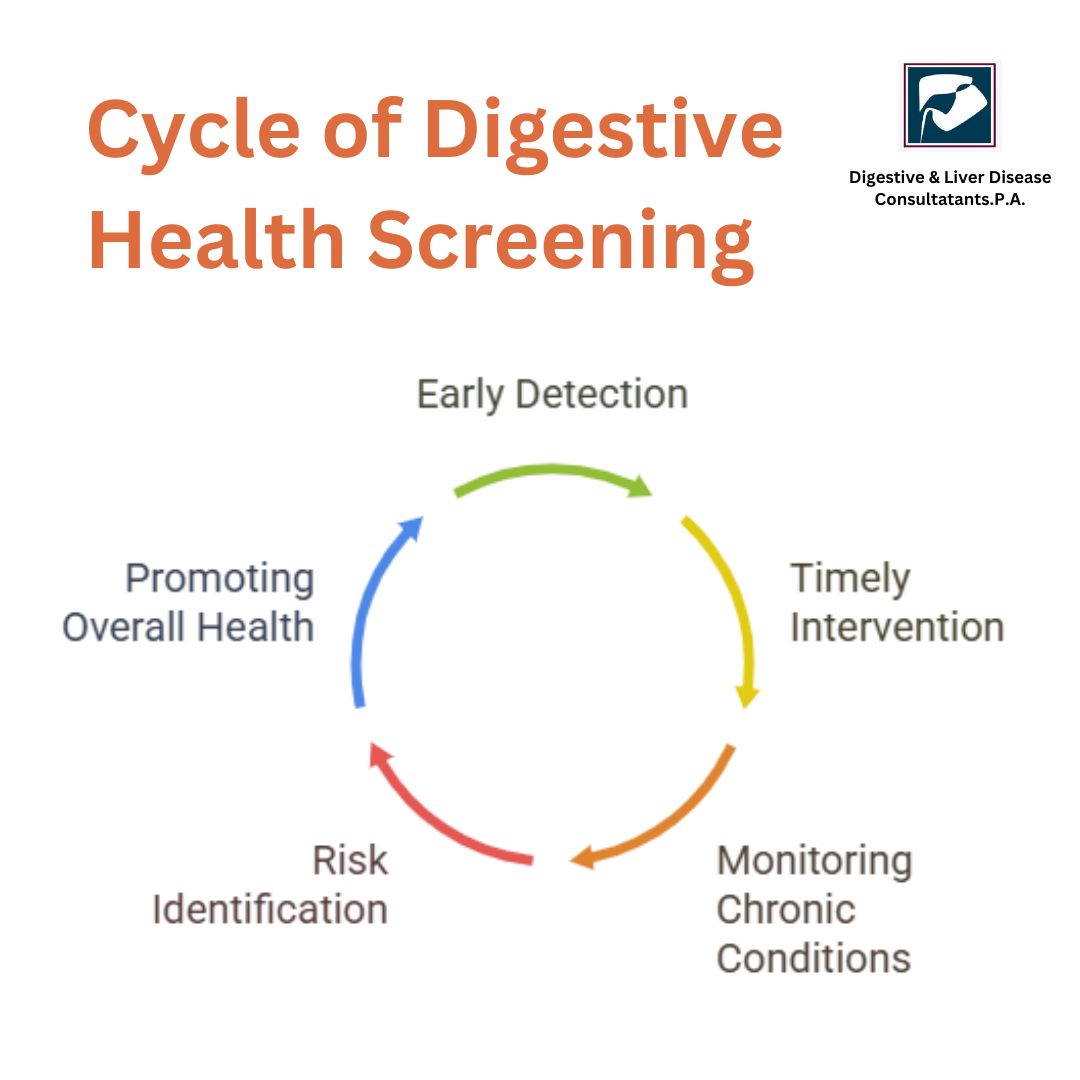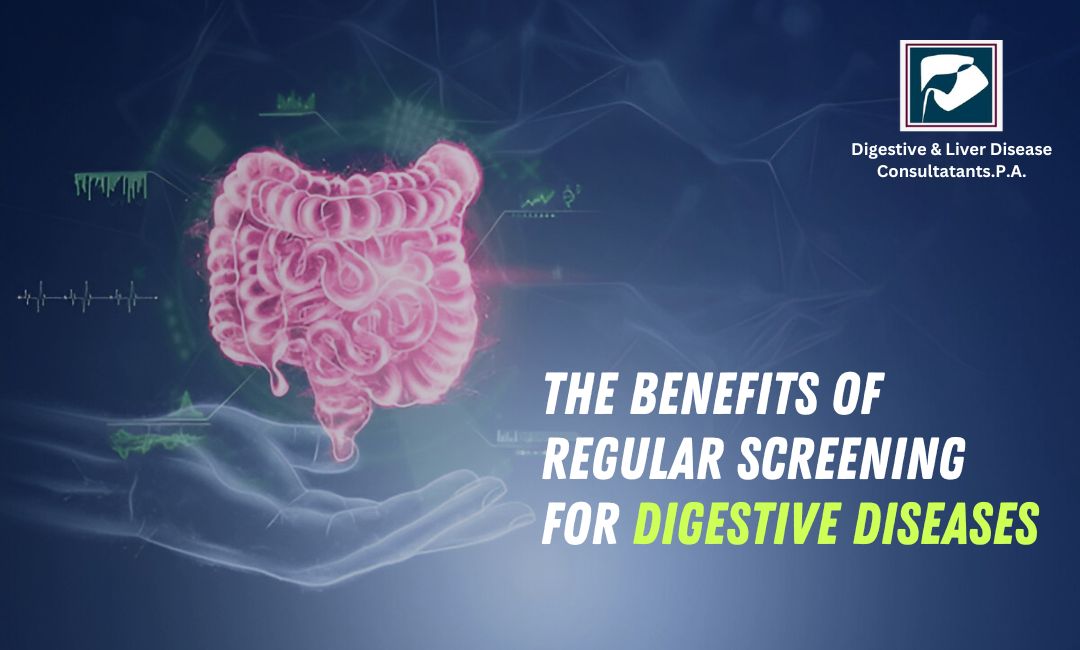When it comes to health, prevention is always better than cure. This is especially true for digestive diseases. Many digestive problems can begin silently, without noticeable symptoms. By the time symptoms appear, the disease may have already progressed. That’s why regular screening is so important. It helps detect digestive issues early, often before symptoms start or before they become serious.
At Digestive & Liver Disease Consultants, P.A., we believe that early detection through regular screening can save lives. In this blog, we’ll explore the benefits of screening for digestive diseases and why it should be a part of your healthcare routine.
Why Screening Matters
The digestive system is a complex network of organs that work together to process food, absorb nutrients, and eliminate waste. When any part of this system doesn’t function properly, it can lead to various health issues — from mild discomfort to life-threatening conditions like colon cancer or liver disease.
Regular screening helps detect problems such as:
- Colon polyps and colon cancer
- Gastric ulcers
- Liver disease (such as hepatitis or fatty liver)
- Pancreatic disorders
- Inflammatory bowel diseases (IBD) like Crohn’s disease and ulcerative colitis
- Gallbladder and bile duct conditions
These conditions can often be managed or even reversed if caught early. That’s why screenings can make a big difference in treatment success and long-term health.

Key Benefits of Regular Screening
1. Early Detection of Silent Conditions
Many digestive diseases develop without obvious symptoms. Conditions like colon cancer or non-alcoholic fatty liver disease can progress silently for years. Regular screenings, such as colonoscopies or liver function tests, can catch these diseases early, even when you feel perfectly healthy.
2. Better Treatment Outcomes
When diseases are found early, they are easier to treat. For example, detecting and removing a small polyp during a colonoscopy can prevent it from turning into cancer. Starting treatment early for conditions like IBD can help avoid complications like bowel damage or the need for surgery.
3. Preventive Care Saves Lives
Colon cancer is the second leading cause of cancer deaths in the U.S., but it’s also one of the most preventable. Regular colonoscopies can detect and remove pre-cancerous polyps before they turn into cancer. Screening turns a potential life-threatening situation into a manageable condition.
4. Peace of Mind
Knowing that your digestive system is healthy brings peace of mind. Even if a problem is found, knowing early gives you a head start in treating it. Regular screenings reduce the anxiety of “not knowing” and help you take charge of your health.
5. Cost Savings Over Time
Catching a disease early is not only better for your health — it’s also more cost-effective. Treating an early-stage disease is generally less expensive than treating a more advanced condition that may require surgery, hospital stays, or long-term medication.
6. Customized Health Planning
Regular screenings provide valuable insight into your health. This information helps your doctor create a personalized care plan, including dietary changes, lifestyle adjustments, medications, or more frequent checkups to stay ahead of any concerns.
Common Digestive Screenings You Should Know
Here are some of the most recommended screening tests for digestive health:
Colonoscopy: Screens for colon cancer and polyps; recommended for adults starting at age 45 (or earlier with a family history).
Upper endoscopy (EGD): Used to examine the esophagus, stomach, and the first part of the small intestine for ulcers, acid reflux, or tumors.
Liver function tests: Simple blood tests to check how well your liver is working and detect liver disease.
Stool tests: Can detect hidden blood, infections, or markers of inflammation in your digestive tract.
Imaging (like ultrasound, CT scan, or MRI): Helps check for structural issues in your liver, gallbladder, or pancreas.
Capsule endoscopy: A small camera in a pill-sized capsule checks parts of the small intestine not easily reached by traditional endoscopy.
Your doctor will recommend screenings based on your age, family history, symptoms, and risk factors.
When Should You Start Getting Screened?
The timing for screenings depends on the specific test and your risk level. Here’s a general guideline:
Colon cancer: Start at age 45 if you’re at average risk; earlier if you have a family history or other risk factors.
Liver tests: Recommended if you have risk factors like obesity, diabetes, heavy alcohol use, or a history of hepatitis.
Upper endoscopy: Recommended if you have symptoms such as chronic acid reflux, difficulty swallowing, or stomach pain.
Other screenings: If you have a family history of digestive diseases or symptoms like ongoing diarrhea, bloating, or unexplained weight loss, talk to your doctor about getting tested sooner.
Why Choose Digestive & Liver Disease Consultants, P.A.?
At Digestive & Liver Disease Consultants, P.A., we specialize in the diagnosis, treatment, and prevention of digestive and liver conditions. Our board-certified gastroenterologists offer state-of-the-art screenings and compassionate care tailored to each patient’s needs.
With advanced diagnostic tools and a focus on early detection, we help our patients stay ahead of digestive diseases. Whether you're due for a routine screening or experiencing symptoms, our team is here to provide expert guidance and comprehensive care in a comfortable and welcoming environment.
Conclusion
Regular screening for digestive diseases is one of the most powerful tools we have to maintain long-term health. It can detect problems before they become serious, guide early treatment, and give you peace of mind. Don’t wait for symptoms to appear — be proactive about your digestive health.
If you are due for a screening or are experiencing digestive symptoms like abdominal pain, bloating, or changes in bowel habits, don’t wait. Schedule a consultation with the specialists at Digestive & Liver Disease Consultants, P.A. today.






